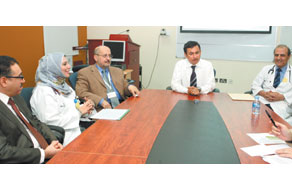 |
| Dr al-Khal and HMC Infectious Diseases consultant Dr Hussam al-Soub, Infectious Diseases specialist Dr Maliha Babar Thapur, Dr Mobayed and Dr Abu-Raddad during a press conference yesterday |
Healthcare providers in the country were yesterday urged to make conscious efforts not to discriminate against or stigmatise people living with the human immunodeficiency virus and acquired immune deficiency syndrome (HIV/Aids).
As part of 2011 World Aids Day, the HMC in partnership with the Supreme Council of Health, Weill Cornell Medical College in Qatar, Qatar University and Qatar Foundation organised a symposium tagged: “Stigma and Discrimination in Healthcare Setting”.
The symposium was held to sensitise the healthcare professionals such as doctors, nurses, technicians and other allied healthcare providers about HIV in an effort to eliminate stigma and discrimination against people living with HIV/Aids (PLWHA).
“For the 2011 World Aids campaign, healthcare providers in the Eastern Mediterranean region are being asked to examine how to reduce persistent stigma and discrimination against PLWHA and the theme for the region is “Stigma and Discrimination”, HMC medicine department chairman Dr Abdullatif al-Khal said yesterday.
He stressed that if efforts were not made to limit the stigma and discrimination against PLWHA, the region might not get rid of the virus, which is being viewed lately more as a chronic
disease.
“If healthcare workers continue to openly discriminate against PLWHA, many people will not be willing to come out for testing and if they did not, the risk of getting more and more people infected will continue to be there whereas one of the important ways of curbing the spread of HIV is actually through voluntary counselling and testing, which will encourage early treatment as it controls the virus from multiplying thus preventing it from becoming Aids,” he maintained.
Dr al-Khal called on residents to go for voluntary testing, saying it was to their own advantage.
During an opening remark at the symposium, SCH Public Health Department director Dr Mohamed bin Hamad al-Thani said stigma and discrimination was one of major concerns for healthcare setting and that there was the need to intensify efforts to
control it.
“We need to redouble our efforts to control stigma and discrimination against PLWHA and right now at the national-level we are going to constitute a zero tolerance to stigmatisation and discrimination in order to achieve a zero infection and zero prevalence rate of HIV/Aids for the country,” he stated.
Sharing data on HIV/Aids in the MENA region, WCMC-Q Biostatistics, Epidemiology and Biomathematics Research Core director Dr Laith Abu-Raddad said that an accelerated new HIV infection was being noticed among specific groups such as injectable drug users, homosexuals and commercial sex workers in the region.
“Data shows that up to 40% of HIV infected people in some MENA countries are injectable drug users, some 30% are homosexuals and a substantial prevalence was also noticed among sex workers,” he noted.
He mentioned that majority of women living with HIV in the region, some 97% got the virus through their spouses, who have patronised a sex worker.
Social Rehabilitation Centre psychiatrist and programme director Dr Mamoun Mobayed says that stigma and discrimination put people off from seeking medical help regarding HIV and that it can also drive many into depression and confusion and make them avoid interpersonal relationships.

